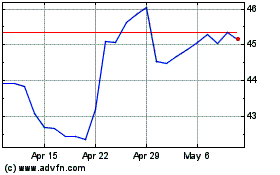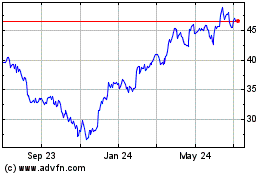By Gautham Nagesh and Paul Vieira
Canadian auto workers kick off contract negotiations with
Detroit's Big Three Wednesday, with union officials aiming to
preserve jobs in one of the country's bedrock manufacturing
industries even as a disproportionate amount of auto investment
heads to Mexico.
Negotiators for Unifor, Canada's largest private-sector union,
are most focused on securing future product commitments, but at
least one U.S. car company is unlikely to make those commitments
before the contract expires in mid-September, according to a person
familiar with negotiations. The union, representing 20,000 auto
workers in these talks, plans to strike if demands aren't met.
Negotiations commence a year after the United Auto Workers
secured raises and healthy bonuses for U.S. factory workers
employed by General Motors Co., Ford Motor Co. and Fiat Chrysler
Automobiles NV.
Unifor workers have seen two modest cost-of-living adjustments
since 2007 and don't have profit-sharing agreements. Unifor
President Jerry Dias says the main thing the union needs is a
guarantee that each company will keep building in Canada.
U.S. auto makers are expected to push for a more variable
compensation model in the talks, such as profit-sharing, according
to people familiar with the strategies. Detroit has significantly
revamped its cost structure by offering UAW workers profit-sharing
arrangements resulting in payouts as high as $11,000.
Mr. Dias said the union will push for regular wage increases
instead of bonuses, but says that discussion is meaningless if
there is no future work. The union is willing to strike the auto
makers if no progress is made.
"I'm dead serious that if we don't have product [commitments] in
this set of negotiations, we're not going to have an auto industry
in the long term," Mr. Dias said in an interview. "If you lose
major assembly or engine plants, you lose the supply base that goes
with it."
A GM car factory in Oshawa, Ontario, and a Fiat Chrysler sedan
plant in nearby Brampton are focal points in negotiations.
Together, those plants represent one-fifth of Canadian vehicle
assembly, according to external estimates.
Mr. Dias argues the Canadian auto parts sector's 71,000 workers
could be hit if those plants close.
GM, however, isn't prepared to make a firm product commitment to
Oshawa, where at least one of the two assembly lines is expected to
close next year, according to a person familiar with the company's
strategy. The larger line at Oshawa only has products scheduled
until 2018.
GM negotiators view this round of talks as a first hurdle, this
person said. The company is likely to wait for a labor deal before
deciding Oshawa's future.
Canada's production volumes are in the spotlight as North
American light-production roars back to pre-financial-crisis levels
amid record sales. A disproportionate amount of the billions
invested in North American car factories since then has gone to
plants in the U.S. and Mexico, which attracted tens of billions in
factory commitments in recent years due to low wages and trade
deals.
Excluding currency conversion, Unifor's auto workers make a
maximum $34 an hour wage and benefits can push total compensation
to $65 an hour, according to Ann Arbor, Mich.-based Center for
Automotive Research, or CAR. That is $5 an hour more than GM's UAW
workers make, and the rate is the auto sector's second-highest in
the world behind Western Europe.
Factoring in exchange rates, Canadian auto workers are paid $46
an hour in total compensation. Auto makers have said currency
fluctuations don't play a role in long-term sourcing decisions.
Canada's auto industry employment has fallen 27% since before
the recession as much of the work has shifted to Mexico or
lower-cost factories in the U.S. South, but motor vehicles and
parts are a major component in the economy. Statistics Canada
estimates 19% of Canadian sales abroad come from automobiles and
components needed to make them.
Canadian production and capacity utilization rates remain high.
But the nation's overall automotive trade balance within the North
American Free Trade Agreement region has been roughly halved from
prerecession levels.
"What they have now is a shadow of what they once had, and now
they're fighting to keep what they have," Kristin Dziczek, an auto
analyst with CAR, said.
Demands for flexible compensation could be a sticking point,
since union officials like Mr. Dias have long preferred steady
raises to profit-sharing.
Jim Wheeler, a 50-year-old union representative in Oshawa, said
signing bonuses and profit-sharing may, however, appeal to younger
workers who have seen only 54 cents in total cost-of-living
increases since 2008. Unifor employees received a series of lump
sum payouts since 2012 that equal $9,000.
"That's why we vote on these things," Mr. Wheeler said,
underscoring his belief that workers overall prefer regular
raises.
Christina Rogers and David-George Cosh contributed to this
article.
Write to Gautham Nagesh at gautham.nagesh@wsj.com and Paul
Vieira at paul.vieira@wsj.com
(END) Dow Jones Newswires
August 10, 2016 05:44 ET (09:44 GMT)
Copyright (c) 2016 Dow Jones & Company, Inc.
General Motors (NYSE:GM)
Historical Stock Chart
From Mar 2024 to Apr 2024

General Motors (NYSE:GM)
Historical Stock Chart
From Apr 2023 to Apr 2024
